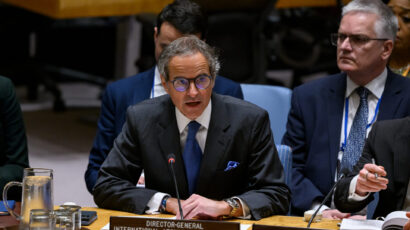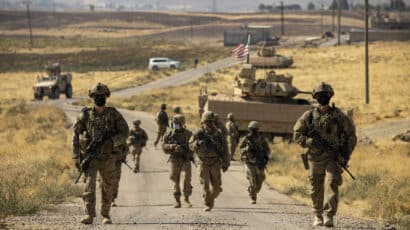US budget cuts threaten nuclear safety
By Fissile Materials Working Group | May 28, 2013
On May 20, the US House of Representatives approved legislation that would implement two major international nuclear security accords. The move should be cause for celebration among those fighting the spread of nuclear weapons and related materials around the world. In fact, though, the nonproliferation community is in the doldrums, as Washington is consumed by budget battles that threaten US national security.
In the United States, nuclear nonproliferation programs are housed under the Energy Department's National Nuclear Security Administration, where their goals are to "detect nuclear and radiological materials, and [Weapons of Mass Destruction]-related equipment; secure vulnerable nuclear weapons and weapons-usable nuclear and radiological materials; [and] dispose of surplus weapons-usable nuclear and radiological materials." The programs are critical to keeping the United States and the world safe.
On March 1, unfortunately, across-the-board cuts known as "sequestration" were applied to the majority of government budgets, including the Energy Department's nonproliferation programs.
Worse, Congress was unable to pass a regular appropriations bill for Energy for this year. It instead passed a stopgap funding bill known as a "continuing resolution" in late March, which will keep the government operating through September.
Then in April, in its budget proposal submitted to Congress for fiscal 2014, the Obama administration proposed cutting the Energy Department's core nuclear nonproliferation programs. The administration's budget request for these four programs is for $1.325 billion, a 16 percent reduction from the 2013 appropriation. The cut stems from two factors: the tight budget caps in the 2011 Budget Control Act, and the administration's decision to shift some funds from nonproliferation into nuclear weapons.
The specific nonproliferation programs cut include the Global Threat Reduction Initiative, which secures vulnerable nuclear and radiological materials located at civilian sites worldwide. The president's budget cut it by 15 percent, to $424 million for fiscal 2014. Another core program, called International Material Protection and Cooperation, was hit even harder. Charged with securing vulnerable stockpiles of nuclear weapons and weapons-usable nuclear material internationally, its budget was sliced by 36 percent to $370 million.
The Energy Department claims that the budget reductions are actually good news, because they demonstrate that programs to secure vulnerable nuclear materials in other countries have accomplished most of the Energy Department's nonproliferation goals and so efforts can now wind down. However, Sen. Dianne Feinstein, a California Democrat and chair of the Senate Energy and Water Appropriations Subcommittee, which oversees the Energy Department budget, summed up the shortcomings of the reduced budget when she told a subcommittee meeting in April that "the goal to convert research reactors using highly enriched uranium to [reliance on less-dangerous] low enriched uranium has slipped eight years to 2030. Efforts to secure radiological sources in the United States and overseas [have] slipped 20 years to 2044. In addition, there is no target date to secure more than a thousand kilograms of highly enriched uranium and a thousand kilograms of plutonium. So rather than getting the job done, these materials are going to be vulnerable for a long, long time." Obama labeled nuclear terrorism "the single biggest threat to US security" at the 2010 Nuclear Security Summit, but the administration is not putting its money where its mouth is.
House committees began drafting their annual budget bills for fiscal 2014 in late May, with Senate committees to follow in June. They hope to send the bills to the president's desk before October 1, the beginning of the federal budget year. However, the ongoing budget stalemate may result in Congress failing to pass a regular appropriations bill for a second year. Given the administration's proposed budget cuts, another continuing resolution may be the best outcome for the Energy Department's nonproliferation programs.
Meanwhile, the administration has made little progress in the Senate on the two important nuclear terrorism agreements. For three years, the White House has pushed for legislation that would allow the United States to ratify the Convention on Suppression of Acts of Nuclear Terrorism and a 2005 amendment to the Convention on Physical Protection of Nuclear Materials. The administration believes that these are key elements of the international legal architecture to combat nuclear terrorism. The Senate approved both treaties in 2008, but they require implementing legislation by Congress before the United States can ratify them. The House of Representatives adopted the implementing legislation last year with bipartisan support, and did so again in May.
However, in 2012 the implementing legislation died in the Senate because of the objection of one lawmaker, Sen. Chuck Grassley of Iowa. Grassley is the ranking Republican on the Senate Judiciary Committee. He bottled up the measure by insisting that the bill expand the scope of nuclear-terrorism crimes punishable by the death penalty. House Republicans, House Democrats, and Senate Democrats did not feel such a provision was needed. It appears the bill may stall again in the Senate because of opposition from Grassley.
Another battle may await the administration in the Senate. On May 9, Obama nominated Rose Gottemoeller to serve as undersecretary of state for arms control and international security, one of the most important administration positions for nonproliferation policy. Already serving as acting undersecretary since Ellen Tauscher left the post in 2012, Gottemoeller is also the assistant secretary of state for arms control, verification, and compliance, and was the lead US negotiator for New START. She may face a confirmation fight led by conservative senators, not so much over her qualifications as over the administration's arms control and nonproliferation policies.
President Obama is expected to give a major nuclear weapons speech this summer, perhaps in July. The White House has been compiling a list of possible initiatives on nuclear weapons and nonproliferation issues to be included in the speech. With legislative gridlock likely for the remainder of the Obama administration, the White House will turn increasingly to executive actions it can use to achieve its goals. Nonproliferation advocates should shake off their doldrums and think about policy initiatives the president can implement with the stroke of a pen.
David Culp, who wrote this article, is a legislative representative for the Friends Committee on National Legislation, a Quaker lobbying organization.
Together, we make the world safer.
The Bulletin elevates expert voices above the noise. But as an independent nonprofit organization, our operations depend on the support of readers like you. Help us continue to deliver quality journalism that holds leaders accountable. Your support of our work at any level is important. In return, we promise our coverage will be understandable, influential, vigilant, solution-oriented, and fair-minded. Together we can make a difference.
Topics: Columnists















